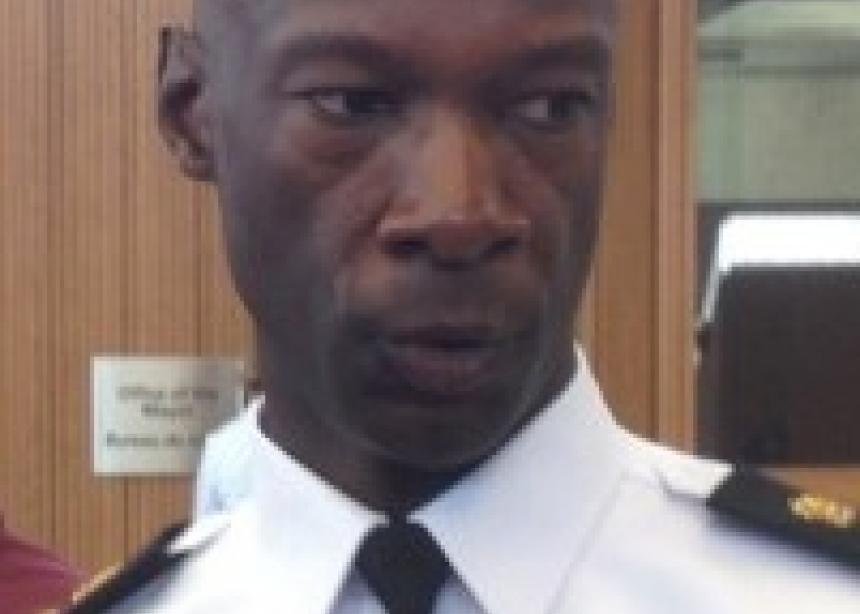The sound-byte was simple, “What would happen if we all just truly—I'm talking about all religious stripes here—started praying for the peace of this city and then actually started putting some action behind that?” With that quote Devon Clunis, Winnipeg's incoming chief of police, stirred up a brief and vigorous media storm. Responses ranged, predictably, from clear support for someone publicly declaring Christian values to criticisms over the misuse and abuse of religion in the public sphere.
Canada has remained relatively unscathed from the extreme and polarizing 'culture wars' around religion in the United States. I was recently given a Christian newspaper based in Wisconsin in which the front cover displayed an image of David vs Goliath. David was positioned from the reader's perspective watching the monstrous and clearly enraged Goliath approach, holding . . . wait for it . . . a rainbow flag. The message of course is clear, good Christian values are under threat, vulnerable to the powerful and encroaching forces of evil. Perhaps a bit much whatever your position on this matter. What has been interesting with the Clunis interview is how quickly the conversation has shifted precisely towards this sort of tone.
In response to this uproar Clunis went back on record trying again and again to 'set the record straight,' as he put it, and remind everyone that he called for prayer and action. Looking at the media responses to his initial interview I wish he instead would have focused on how the interview started. Clunis began the interview confessing that he was tired of the sort of violence that occurs in Winnipeg. Now, he was speaking of violent crime in that context but in light of this controversy I want to address other claims of violence that have emerged.
In letters to the editor there have been claims that such religious sentiments do violence to modern constructs of Reason sending us back to faith in Santa Claus. One editorial in the Winnipeg Free Press implied how this incident revealed the ease with which people turn to 'Christian-bashing' which would not be tolerated against other religions or ethnic groups. An audio clip of ethicist Arthur Schafer was played on CBC in which Schafer accused Clunis of 'exploiting his position' and in so doing Clunis 'violates the liberties' of others. It may take just a little prodding but it seems we all have ready-made sketches of our Goliath bearing down on us.
I have my own questions about Clunis's theology as it appeared in his Christian Week interview. My concern is more on his direct attributing of God's hand in his success (leaving open dangerous implications for those not as fortunate). However, I am no more concerned about his theology then the manner in which his statements were taken up as tools for waging a different war.
Are Christians now really the most readily persecuted? By what standard, by having to deal with some discomfort in the workplace? Is Reason really at stake here? And whose reason are we talking about again? And what exactly is the liberty being 'violated' according to Schafer? With respect to Clunis it is, at its most tangible, a conceptual violence but one that Schafer is also asking Clunis to undergo by separating his moral environment from his position. These are all accusations of violence. And I suppose, in their own way, they have some merit or at least some cause for reflection.
But these arguments, as far as I can tell, are coming from places of relative security and privilege. These are places that can afford to have these conversations; places that have the leisure and resources to carry them out. These conversations come from the church, the media, political offices, and the academy. Clunis's words were quickly taken from the hopes of addressing bloodshed in neighbourhoods to the work of defending privileged institutions.
I am not sure it was wise to frame prayer as a sort of 'instrument'. But I confess that is because I don't rightly understand prayer. I don't really know if I am doing it right or what it in fact does. But I live in a neighbourhood of Winnipeg where I have at times felt crippled by the weight of the violence that is inflicted within and upon my community. And many times all that can escape my lips is a resigned bit of profanityor at my more hopeful moment there may even be ahave mercy.
This may not be the type of prayer Clunis was referring to, but at this point I will take it over the pious wars of those (myself and the church included) defending social forms that already exclude so many. Before returning to the issue of violence in our cities and neighbourhoods let's discard our straw-men, our caricatured Goliaths, and do no further violence to those already suffering, those stripped of the leisure and opportunity of carrying on such narcissistic wars of privileged preservation.
David Driedger is Associate Minister at First Mennonite Church in Winnipeg and a regular blogger at Canadian Mennonite online.
--Oct. 30, 2012



Add new comment
Canadian Mennonite invites comments and encourages constructive discussion about our content. Actual full names (first and last) are required. Comments are moderated and may be edited. They will not appear online until approved and will be posted during business hours. Some comments may be reproduced in print.